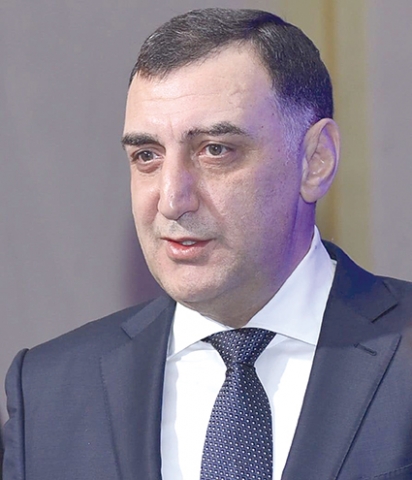Irakli Kervalishvili: We'll Have a Deep-Water Marina in Poti by Year-End 2020
OPIC, a US-based Private Investment Corporation, is to finance PACE Group’s new port and terminal with $50 million. GEORGIA TODAY spoke to PACE Group co-founder Irakli Kervalishvili about the project.
OPIC is spending $50 mln on construction of the marine terminal. How did PACE Group manage to attract such a large investment?
OPIC's trust in PACE Group and Georgia is so high that this unprecedented loan has been allocated. OPIC has been active in the Caucasus region for 20 years, however, this is its first investment in transport infrastructure, distinguished by a volume that clearly demonstrates this project is real. OPIC expressed interest in the project in 2014 and studied PACE Group activities during this period. A lot of time was been spent on engineering expertise, marine-nautical navigation, environmental protection of high standards, as well as labor safety conditions, and, on seeing the convincing results, they agreed to offer a $50 million low-interest loan, which we have 15 years to pay back.
The project cost amounts to $120 million, at the first phase $93 million. What works are planned within the first phase?
In order to maintain and enhance Georgia's importance as a transport corridor, it is essential to develop infrastructure, and development of transport infrastructure should first begin with marine infrastructure. The country needs a deep-water sea port, hence PACE Group’s developing 25 hectares of port infrastructure. Over 700 meters of berth construction is planned. The project will be implemented in two phases. Within the first phase, 260 meters will be built of a depth of around 12m. The $93 million includes transportation infrastructure, such as railways, and open and closed warehouses. This is not a new project: PACE Group started in 2015 and the first phase is partially fulfilled, with $28 million spent so far. The PACE terminal is up and running, we are starting up cargo, and the terminal is busy enough to necessitate a deep-water port. We have an open warehouse of about 10 hectares and a 30-thousand-ton capacity in closed ones. We add 50 thousand tons of closed warehouses due to the demand and these are already full. We have Carbamide, mineral fertilizers to arrange and need additional infrastructure. These warehouses and infrastructure will carry about 1.5 million tons of cargo. Depending on the size of cargo, we need to be able to receive big ships, otherwise we will lose cargo. PACE Group employs over a thousand people and this number will increase as a result of this project.
Tell us about the second stage of the project.
We have already prepared tender documentation. In two-three months we will announce the tender to choose the company that will perform the second-phase construction works. Presumably, Georgian companies will not be able to participate in the tender because OPIC's requirements are quite high, so most likely we will see Norwegians, Dutch and Turks expressing interest. Obviously, the selected company will need subcontractors and we will make recommendations of those Georgian companies with whom we have successfully cooperated before. We have a very strict schedule; the works should end 18 months after it begins, and at the end of 2020 we will have a deep-water terminal. In the second stage of the project, not only OPIC, but other financial institutions have expressed their willingness to cooperate. We plan to develop a warehouse infrastructure, including liquid cargo (we now focus on bulk cargoes). The PACE terminal has a 27-year history and I can name a number of examples where we were able to attract new cargoes by our own efforts. Aluminum oxide, which is a raw aluminum production, was carried from Russia by a Tajik factory. We managed to convince them to move 35 thousand tons through the Poti Port, and then upped it to 150 thousand tons annually. Poti Port became a hub for that Tajik factory and aluminum realization was made from here thanks to the proximity to the European market. The PACE terminal was the first in Georgia to craft cargoes that could not be obtained by any other port of our country. Among them is Turkmenistan Mineral Fertilizer - Carbamide, which was transferred to Poti in 2016. Prior to that, transportation went through Russia and Iran. Also, PACE Group was the first to implement a modern reverse-type wheat terminal, which is the only one in the country. Last year we dealt with 100 thousand tons of Russian-Kazakh wheat. The terminal also processes mineral fertilizers produced in Central Asian countries. By means of our terminal, we transported BP pipelines within the Shah Deniz 2 project, which is so important for our region, in 2015-2017. The relevant infrastructure was not in the country, we allowed these pipes to be transported and stored here.
Sum up last year and give us an insight into what to look forward to from PACE Group in future.
2018 was financially hard for the company. Our annual cargo turnover amounts to about 3 million tons, but last year it decreased to 2.6 million tons. In 2018, we signed a number of important agreements and we are expecting to increase the cargo by 700 thousand tons this year. Russian coal, Turkmen sulfur, and wheat flows will increase. During the past year, PACE Group has taken an important step, as many companies have promised to cooperate with us.
By Mariam Merabishvili











